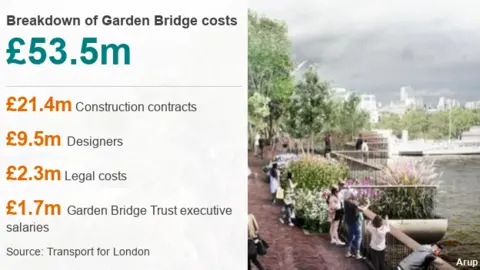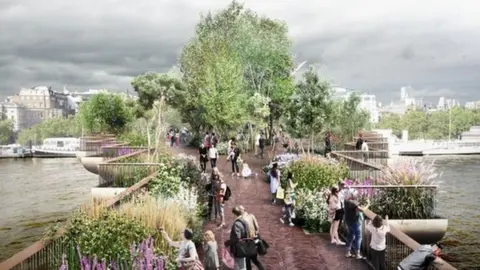Failed London Garden Bridge project cost £53m
 Heatherwick Studio
Heatherwick StudioA failed plan to build a bridge covered with trees and flowers over the River Thames in central London cost a total of £53m, it has been revealed.
A Transport for London (TfL) inquiry showed the Garden Bridge Trust spent £161,000 on a website and £417,000 on a gala for the abandoned project.
The design of the bridge cost more than £9m and the charity paid its executives £1.7m.
Around £43m came from the public's pocket, TfL added.
Doubts began to surround the project, overseen by Boris Johnson, after it lost the support of London Mayor Sadiq Khan in April 2017.
It was officially abandoned in August of that year after a review recommended it be scrapped.

In July 2015, up to £60m of public funding was made available to the trust - £30m each from Transport for London (TfL) and the Department for Transport (DfT).
TfL will now pay a final £5.5m of public money to the trust as part of the scheme's cancellation agreement, which the transport body said was 40% lower than what it could have been.
The payout will help refund donors including £3,200 to the winner of a Garden Bridge auction prize who did not receive their promised game of "table tennis with Boris Johnson".
Labour London Assembly member, Tom Copley AM, said: "It's galling to see the costs of Boris' botched Bridge continuing to escalate for London's taxpayers.
"David Cameron needs to answer why, in his eagerness to see Boris Johnson's scheme go through, he intervened to overrule the advice of senior civil servants in order to extend the underwriting for the Bridge."

Analysis by BBC London transport correspondent, Tom Edwards
This was the tiara on the Thames that lost its shine and then died.
The project promised a lot but delivered nothing, swallowing £43m of public money in the process.
The biggest expenditure was the £21m contract to build the bridge - with campaigners still wanting to know why that was allowed when land had not even been secured.
There is an incredible amount of detail in the recent Transport for London report: it cost £161k for a website and £417k for a gala fundraiser.
Critics say the spending was gratuitous. And while many wanted the bridge, others did not. The questions won't stop here.

Caroline Pidgeon, chair of the London Assembly's transport committee, said: "The details of wasted money spent on the Garden Bridge project is the final confirmation of the utter folly of the project.
"The Garden Bridge Trust have squandered public money in a way no responsible charity should have behaved.
"No charity needs to spend £160,000 on a website or over £400,000 on a gala dinner."
Director of City Planning at TfL, Alex Williams, said: "We worked to ensure that the cost to the public sector has been kept to a minimum.
"We have now confirmed the final payment legally required under the terms of the underwriting agreement made by the Government. This formally ends our involvement with the project."

Garden Bridge timeline
 Arup
Arup- The idea of a "floating paradise" as a memorial to Princess Diana was suggested by Joanna Lumley as far back as 1998
- The plan gathered momentum in 2012 and the following year then mayor Boris Johnson supported the scheme, pledging that TfL would help deliver it. It was also backed by then chancellor George Osborne
- Planning permission was granted in 2014
- The scheme has been beset by problems over its funding and lacked support from some residents
- In September 2016, Sadiq Khan ordered a review to find out if value for money was being achieved
- In October 2016, the National Audit Office revealed David Cameron ignored the advice of his own civil servants not to provide further taxpayer funds to the Garden Bridge Trust because of the risks of it not going ahead
- In January 2017, accounts filed with Companies House showed a £56m shortfall in the trust's accounts
- In April, Dame Margaret Hodge concluded it would be better to ditch the project rather than risk uncertain costs
- Following this report, Mr Khan withdrew his support
- In December 2017, Mr Johnson was called before the London Assembly to give evidence on the project's failure
